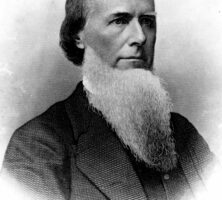The term Bourbon Triumvirate refers to Georgia’s three most powerful and prominent politicians of the post-Reconstruction era: Joseph E. Brown, Alfred H. Colquitt, and John B. Gordon. This trio practically held a lock on the state’s U.S. Senate seats and governor’s office from 1872 to 1890: Brown as senator from 1880 until 1890; Colquitt as governor from 1876 through 1882, and as senator from 1883 until 1894; and Gordon as senator from 1872 until 1880, governor from 1886 until 1890, and senator again from 1891 until 1897. The political careers of all three men benefited from their service during the Civil War (1861-65); Brown had served as the governor of Confederate Georgia, and Colquitt and Gordon had both risen to the rank of major general in the Confederate army by the war’s end.
Political and Economic Interests
Colquitt, one of the state’s leading planters, cast himself as a representative of the interests of the old planter class, while Brown, an industrialist who became one of Georgia’s first millionaires, represented the New South businessmen. Gordon had a mixed record as a businessman and a worse record as a planter, but Gordon excelled at espousing the New South rhetoric of commercial and industrial development by shrewdly exploiting the Lost Cause of the Confederacy.

Courtesy of Hargrett Rare Book and Manuscript Library, University of Georgia Libraries.
All three men had extensive interests in the railroad and coal-mining industries, among other commercial pursuits. All three championed white supremacy; a frugal state government that demanded little of taxpayers, and accordingly provided few services; and the maintenance of subservient labor forces on farms and in factories. Gordon and especially Brown both made use of convict labor in their industrial enterprises.
The “Atlanta Ring”
While Brown, Colquitt, and Gordon shared many economic and political interests and beliefs, they also differed on many points, and historians have since questioned the validity of the epithet “Bourbon Triumvirate.” The noted southern historian C. Vann Woodward argued that the term Bourbon, which implies a steadfast refusal to accept or learn from the defeat of the Civil War and adapt to new realities, hardly fit these three postbellum Georgia leaders, and other historians have convincingly shown that the trio did not possess the unity of interests and purpose that the term triumvirate implies.

From The History of the State of Georgia, by I. W. Avery
More aptly, the trio could be viewed as the core of the larger “Atlanta Ring,” which also included Atlanta Constitution editors Evan Howell and Henry W. Grady. These two preeminent journalists, particularly Grady, played important roles in the trio’s political strategizing, most notably in the suspicious series of events involving Gordon’s sudden resignation from the U.S. Senate and his replacement by Brown in 1880, as well as Gordon’s somewhat delayed but ultimately successful entry into the 1886 governor’s race. In this contest, Grady masterfully exploited Gordon’s Civil War legacy to help him derail the seemingly unstoppable campaign of Augustus O. Bacon of Macon, a leading opponent of the Atlanta Ring who later became a U.S. senator himself.
Demise of the Triumvirate
After Gordon became governor, the always limited solidarity among the members of the Bourbon Triumvirate began to collapse. The friction that had long existed between the free-trader Colquitt and the protectionist Brown erupted into open conflict after U.S. president Grover Cleveland’s low-tariff address of 1887. Brown and Gordon had harbored dislike for each other ever since the latter’s role in resolving the Hayes-Tilden election dispute of 1876, and after a rebellion of convict miners at Brown’s Dade Coal Company in 1886 exposed the horrors of the convict lease system, Gordon made convict lease reform a key part of his platform. (Gordon had apparently divested himself of convict laborers by then.) As governor, Gordon presided over a state investigation of convict leasing that produced only limited reform but a rather public deterioration of his relationship with Brown. Gordon also had a falling-out with his old supporter Grady, who died in 1889.

Courtesy of Library of Congress, Prints and Photographs Division
The rise of the Farmers’ Alliance to a position of strength within the Democratic Party in 1890, the rising influence of the popular U.S. representative Thomas Watson, and the passage of time essentially ended the era of the Bourbon Triumvirate. Brown and Colquitt both died in 1894, and Gordon retired from politics after completing his last term in the U.S. Senate in 1897. Never before and never since, however, has a trio of men collectively exercised such dominance over state politics, even if the extent to which they did so as a collective unit was exaggerated in the minds of the press and the public.










